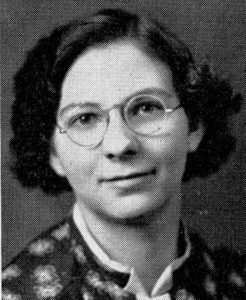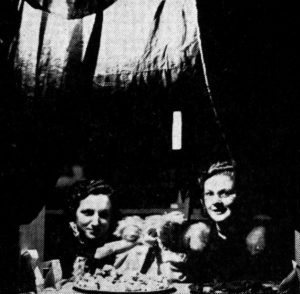 It felt natural for Edith Roller to find herself graduating from the Colorado Teachers College in the mid 1930s. Her mother had taught in small schools in Rocky Mountains towns near Steamboat Springs, towns that revolved around ranching and mining. Her father seems to have worked several jobs as he moved his family east toward the big city of Denver. By the time Edith entered the Colorado Teachers College in 1933, she listed her hometown as Denver, not Yampa where she spent the first years of her life or Steamboat Springs, or even Mount Harris, the site listed on her passport as her birthplace.
It felt natural for Edith Roller to find herself graduating from the Colorado Teachers College in the mid 1930s. Her mother had taught in small schools in Rocky Mountains towns near Steamboat Springs, towns that revolved around ranching and mining. Her father seems to have worked several jobs as he moved his family east toward the big city of Denver. By the time Edith entered the Colorado Teachers College in 1933, she listed her hometown as Denver, not Yampa where she spent the first years of her life or Steamboat Springs, or even Mount Harris, the site listed on her passport as her birthplace.
The Colorado Teachers College, founded in 1889 in Greeley, served the needs of the recently-established state to educate teachers for the many small, local schools sprinkled through the towns deep in the mountains and spread across the state’s eastern prairies. The college has gone through several name changes and is now known as the University of Northern Colorado, with a mission that has extended far beyond training teachers, but when Edith graduated in 1937, the college was still focused on teaching and producing skilled instructors for positions around the state.
Edith arrived at college for the fall semester of 1933. Fascinated with her new social opportunities, she decided to participate in Rush Week and was listed in the student newspaper as an attendee at a tea event and a barbeque organized by the Alpha Sigma Tau sorority in Greeley (The Mirror vol. 14, issue 4, October 12, 1933, p. 3-4).
Like many students in their late teens and early twenties, Edith was active during her college years. After her attempt to rush the Alpha Sigma Tau sorority – which was apparently unsuccessful since other documentation of that connection is lacking – she became involved in school-sponsored clubs and joined an academic society. During her sophomore year (1934-1935), her name does not appear as a member of any of the clubs on campus. But by her junior year (1935-1936) she was a member of the YWCA and was admitted into Phi Alpha Theta, the National Honor Society for History. For those who are familiar with Edith’s journals documenting her experience with Peoples Temple and at Jonestown, her academic interest in teaching and studying history is unsurprising.
Edith blossomed during her senior year, joining more clubs and becoming more involved with campus activities, all documented in the 1937 edition of the Cache la Poudre Yearbook for the Colorado Teachers College. In addition to her continuing membership in the YWCA and Phi Alpha Theta (p. 235, 244), she joined the Quisiamovir Club for her interest in the languages of Europe (p. 230), as well as the Dickerson Club, a club for those interested in social studies and history (p. 217).
 The 1937 yearbook also has two photos of Edith at the age of 22. Her senior picture (p. 109) and an unlabeled photo of her with another student on the “Festivals and Fun” (page 210).[1]
The 1937 yearbook also has two photos of Edith at the age of 22. Her senior picture (p. 109) and an unlabeled photo of her with another student on the “Festivals and Fun” (page 210).[1]
Edith Roller graduated from the Colorado Teachers College on June 11, 1937 with degrees in History and Social Studies (The Mirror, June 18, 1937, p. 8). The curriculum for these programs was oriented almost entirely toward preparing students to teach the subjects to children. The catalogue for 1937 lists courses for the Department of Social Studies, and nearly every course description recognizes of the importance of preparing material to teach in schools. Edith’s duties when she went to Jonestown in January of 1978 focused on teaching in the Jonestown school. Although she finished her teacher training nearly forty years prior to her work with Peoples Temple, her passion for teaching that developed as a young adult in college was finally paying off as a leader in the Jonestown education program.
In addition to her interest in history and understanding other cultures, two keen interests that she pursued throughout her life, one brief insight into her later political leanings can be found in a short newspaper account from the Greeley Daily Tribune. On February 20, 1937, the paper carried a brief notice of a panel of students and teachers who were to gather in a local junior high school to discuss neutrality legislation. Edith was a spokesperson for the position that promoted American neutrality during the wars in Europe and the Pacific, arguing for continued peaceful diplomacy to find equitable solutions to the conflicts. While later historians would judge this position to be naïve after the crimes of the Axis powers were discovered, Edith’s position showed hints of her later willingness to actively support positions of racial and economic equality.
Edith’s pursuits immediately after college are unclear. She would later tell friends within Peoples Temple that she worked for the CIA, and it is known she did eventually work for Bechtel Corporation, a company with documented ties to the nation’s intelligence community. According to a newspaper note in the Steamboat Pilot (August 30, 1956), Edith did move on from college to a government position. The note is about the return of Edith with her mother to the Steamboat Springs area to visit a relative. On the occasion of the visit, Edith entertained her friends with “moving pictures taken on her trip through India.” The brief notice also mentions that she had been employed in “government work” during the time between graduation and her return to Colorado.
(Dr. Brad Crowell is Chair of the Department of Philosophy and Religion at Drake University. His other article in this edition of the jonestown report is Digital Jonestown: Annotating an American Tragedy. He may be reached at brad.crowell@drake.edu.)
[1] The scans of these photos were provided by the University Archives in the James A. Michener Library at the University of Northern Colorado.